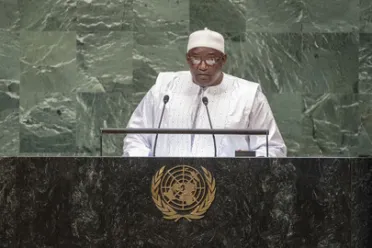Statement
Statement summary
ADAMA BARROW, President of the Gambia, said no country can thrive in isolation amid complex global multilateral challenges, with our salvation as human beings resting in strengthening multilateral institutions and greater international cooperation. “The UN uniquely provides the opportunity to achieve this goal,” he added. Noting the irony of underfunding the United Nations in that context, he called upon Member States to step up support.
Turning to his own country, he noted that after a difficult political impasse in 2016, the Gambia had restored democracy and the rule of law, completing its national electoral process and further pursuing institutional and electoral reforms. With Gambians yearning to oversee their destiny, the Government is implementing a national development plan (2018–2021) to transform the country through infrastructural development, agricultural transformation, macroeconomic stability, job creation and employment. Aiming to deliver “a fully transformed Gambia that has a future”, they have begun to harness information and communications technology (ICT) to catalyse modernization and youth empowerment. The plan is consistent with the 2030 Agenda and Agenda 2063 of the African Union.
Saying he recognized the “importance of a meaningful engagement with the Gambian diaspora — fondly referred to as ‘the eighth region of the Gambia’”, the strategy seeks to utilize the talents and resources of Gambians everywhere. In that regard, there has been a decrease in young people making dangerous journeys across the Mediterranean to Europe. Strongly urging incentivized intervention to curb youth migration, he looked forward to the high-level conference in Morocco to adopt a new Global Compact for Safe, Orderly and Regular Migration.
As a member of the Sahel, the Gambia fully supports implementation of the new United Nations Support Plan for the region, anchored in the United Nations integrated strategy for the Sahel. As the new strategy views the Sahel as a land of opportunity, not hopelessness, he sees it yielding important dividends for Africa, especially in peace, security and the elimination of terrorism. Aiming to “fulfil our aspiration of silencing the gun on the African continent by 2020”, he worried that United Nations peacekeeping missions will suffer from drastic budget cuts and lack of critical resources and called for appropriate reforms.
“As Africans, we must assume leadership for maintaining peace and security on our continent,” he said, commending Ethiopia and Eritrea for “extraordinary efforts” to bring peace to the Horn of Africa, and South Sudan for agreeing to restore peace and work for development. He called on Libya and the Central African Republic to intensify their efforts. Internationally, he affirmed support for the two-State solution for peace between the Palestinians and their neighbours, offered unconditional recognition of the One-China policy and recognized the support of Bangladesh in addressing the plight of Rohingya Muslims. As Chair of the next Organization of Islamic Cooperation (OIC) Summit, he said the Gambia will champion an accountability mechanism to “ensure that perpetrators of terrible crimes against the Rohingya Muslims are brought to book”.
Full statement
Read the full statement, in PDF format.
Photo

Previous sessions
Access the statements from previous sessions.
